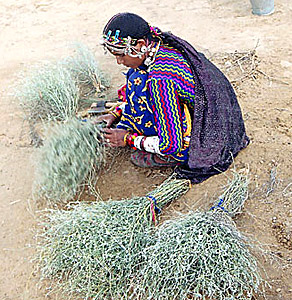 Bhat is a caste of bards since ancient time. Bhat is the caste of bards and genealogists in northern India. The Bhat tribe is renowned for their art of making poetry at marriage festivals and on other occasions. There are two sub-groups with the community, the Rai Bhat and Brahm Bhat. The name Bhat has been derived from the Sanskrit term `Bhatta`, which means a lord. Origin of Bhats has been discussed by several scholars. Mahabharata speaks of a group of bards marching in front of Yudhishthira as he proceeded from Kurukshetra towards Hastinapur. The profession of the Bhats has an ancient and illustrious history.
Bhat is a caste of bards since ancient time. Bhat is the caste of bards and genealogists in northern India. The Bhat tribe is renowned for their art of making poetry at marriage festivals and on other occasions. There are two sub-groups with the community, the Rai Bhat and Brahm Bhat. The name Bhat has been derived from the Sanskrit term `Bhatta`, which means a lord. Origin of Bhats has been discussed by several scholars. Mahabharata speaks of a group of bards marching in front of Yudhishthira as he proceeded from Kurukshetra towards Hastinapur. The profession of the Bhats has an ancient and illustrious history.
The Birm or Baram Bhats are considered as an offshoot of Brahmins. It is believed that their name is merely a corruption of the word Brahmin. Bhat caste is of mixed character. Another large section, Charans, is almost derived from Rajputs. According to one legend, Lord Shiva first created Bhats for attending his lion and bull; in order to prevent the former from killing the latter. But he could not do that. Thus, it compelled Lord Shiva to form new ones. He thus created Charans, equally religious, and gave the charge of these animals. Thus, it is also said that from that time no bull was ever killed by the lion. This legend indicates that the Bhats are peaceful Brahmins and the Charans were Rajputs.
The customs of Bhats are quite similar to those of other castes of equivalent status. The higher castes forbid the remarriage of widows. The Brahman Bhats refrain from flesh and liquor. The Brahman Bhats form a separate sub-caste, and the Rajputs are sometimes called Rajbhat. But besides the Brahman Bhats and the Rajput Charans the caste also has another large body of mixed origin. They are commonly known as the Brid-dhari or begging Bhats. Yet other classes of Bhats are Bairagi Bhats who usually beg from Bairagis, and Dasaundhis or Jasondhis, who sing songs and play instruments in admiration of Devi and also practise astrology. The Bhat tribes are still in request for the exercise of their talents and skill in the recitation of poetry. The Bhats exercise a great influence over the people in Rajpootana. As per Malcolm, the Bhats rank as the genealogists of proud and ignorant chiefs.









